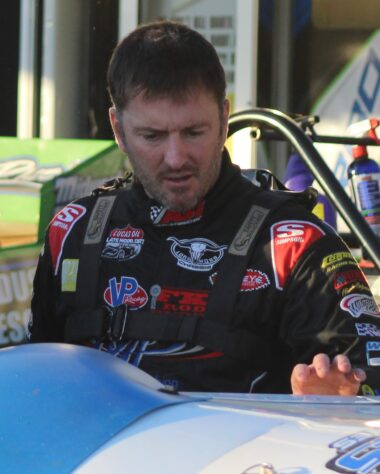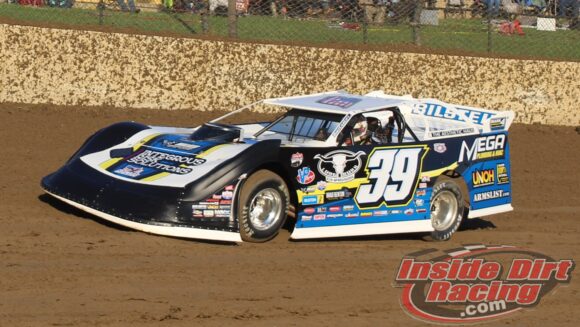Few voices in the Dirt Late Model pit area carry as much weight when it comes to addressing the major topics within the sport than that of Tim McCreadie. The 49-year-old driver from Watertown, NY has been racing at the top level for decades and has experienced great success during that time whether it be in Big Block Modifieds or Late Models.
He, along with Scott Bloomquist and Josh Richards, are the only drivers to have won championships with both the World of Outlaws CASE Construction Late Model Series and the Lucas Oil Late Model Dirt Series. McCreadie has triumphed in crown jewel events such as the World 100, the North-South 100, the USA Nationals and the Prairie Dirt Classic. He has even won the Chili Bowl Nationals in a Midget car.
His is the voice of reason and experience in the field of racing.
Prior to the running of the Dirt Track World Championship at Eldora Speedway, McCreadie took the time to discuss the influx of money into Dirt Late Model racing as well as the expense of the sport for the team owners and purse payout structures with InsideDirtRacing.com.
“I, of course, being a guy who earns my money off how I run, I love to see the influx of money,” McCreadie declared. “What strains it puts on everything else, I don’t really see all of that. I’m sure it doesn’t help the promoter all the time but there’s a lot of things that goes into it. For us, we’re thankful that we get to race for that kind of money.”
The driver of the Don and Gena Bradsher-owned Paylor Motorsports Longhorn Chassis won the first of his two Lucas Oil Late Model Dirt Series titles in 2021 and earned a $75,000 reward for doing so. This season, with the ‘Chase for the Championship’ format in place, McCreadie finished 5th in the overall standings and received that same amount.
LOLMDS champion Hudson O’Neal grabbed $200,000 for finishing ahead of the other three drivers involved in the Chase finale at Eldora. The fourth of the title contenders, Jonathan Davenport, still took home $100,000 at the end of the night in Rossberg, Ohio. Those numbers demonstrate just how much the payouts in the sport have increased in as little time as two years.
That’s a dramatic uptick in points payouts but it came with the introduction of a new way of determining a champion in which the top-4 in the series standings coming into the finale were re-set on equal terms with the highest finisher among those four being crowned.
“We as a team are thankful for it and appreciate how these guys are stepping up,” McCreadie pointed out. “Obviously, there’s caveats that come with it like the format they decided to go with and things like that. It’s part of life, you make sacrifices everyday as a parent, as a race car driver, as a team owner, with people and how to get better so that’s part of it. We’re getting to numbers that if you had told me ten years ago, I would have told you that you were crazy, numbers I didn’t even know were obtainable in our division. It’s pretty neat that we can do that. Hopefully we can keep growing the sport and keep doing it.”
But can these levels of payouts actually be sustained over a long period of time?
“At the end of the day, obviously, anything you do in racing whatever division you’re in, there’s financial strains,” McCreadie stated. “It’s just like anything, you’ll see things go by the wayside, there will be teams who will honestly think, ‘I can’t outlay this type of money to race’. Then you’ll see promoters in certain areas who might not be able to host an event like that, but as that happens, you see other promoters that have bigger events in other divisions who will come in and say ‘I’ve never had a chance to host a race’. It’s part of life, you kind of find your niche.”
The veteran racer sees the increases in payouts as somewhat of a natural progression. As with most other things, evolution is inevitable.
“The cost of living is up, everything is up so the purses had to come up,” he added. “You couldn’t just sit here and say ten grand to win was the standard in 1982 and the standard in 2023. I would imagine some of these purses have reflected the cost of living increases throughout the country. Motors are up, crew help- you have to pay them more- you have to pay everybody more than what we did. If the purses didn’t come up, you’d see more teams leaving.”
From the driver’s seat, McCreadie saw the need for the revamping of dirt racing pay structures. A recent trend has seen series and tracks advertise high payouts for winners, however, those who don’t win, even podium finishers, receive significantly less. Ultimately, that can lead to one team leaving the track very happy while others find themselves scrambling to meet expenses.
“Five grand to win and $300 to start, that’s not a feasible purse anywhere, especially when you look at the back gate when you walk up to the five grand or ten grand show that used to be ten bucks to get in and now it’s forty. We may need to pay a little more to get in the gate but purses going up from top to bottom is what’s going to keep this sport healthy. If you don’t have owners like this(pointing to his car and hauler) and they decide they don’t want to do it to run ninth when ninth pays $500 when the race pays $100,000-to-win, it’s hard to ask owners to keep coming out. Maybe the winner’s share doesn’t need to be 80% more than the second-place is, maybe like a 50%.”
But don’t misunderstand, T-Mac still believes that the winner should be rewarded for beating everyone else to the finish line.
“I’m not saying you need to pay way more for fifteenth, we’re here to win, we’re here to run good,” he insisted. “There’s no reason for a six figure purse and an $80,000 drop off in any race I’ve ever been a part of of. I’m going to come to them, I’m going to continue to come to them, but I don’t see the benefit. I know in the mid-80’s and early 90’s when you only had a newspaper to look at, you could put that headline on that paper and it looked cool, but I think total purse is what gets the fans excited. They just want to see a good race. You don’t race any harder when it’s 100 grand to win than when it’s five, at least I don’t. I put in a 110% every time I go out there.”
Another aspect where McCreadie believes many race teams need to give more consideration is in the area of business management. Overextending too early in the season or in races far from home can lead to financial disaster.
“Sometimes you’ve got take a small step back to move forward,” he explained. “I don’t know what the right number of races are, 85 or 100 or 60. It’s really a team-by-team basis. That’s what’s going to keep teams healthy is knowing what their limits are. Running down to Florida for SpeedWeeks for four weeks straight when you only have two motors, unless you understand that you could spend your entire budget in the first few weeks of the season, then maybe you shouldn’t be looking at going down there. I know everybody wants to go down there because it’s fun and it’s refreshing. It’s like a Mecca of auto racing for three to four weeks down there. But as a realist, you’ve got to look at your budget.”
McCreadie had more to say which can be heard in the recorded interview below
Please consider also reading:
Respond to this post on Twitter by following @RichardAllenIDR and @MichaelRMoats or by liking the InsideDirtRacing.com Facebook page.
Also, NASCAR and pavement racing fans can check out InsideCircleTrack.com







